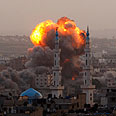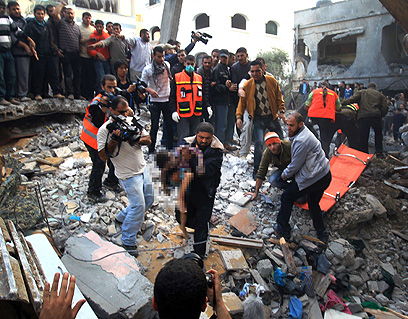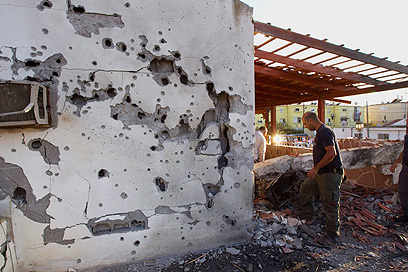
Gazans speak out: 'Killing of family foments hatred'
Residents of bombarded enclave say life is intolerable, but they still support Islamist rulers. 'I thought Hamas forgot about fighting Israel. I was wrong,' Gaza City man says
Life in Gaza, like in south Israel, has become unbearable since the start of Operation Pillar of Defense last week. Shops and schools remain closed, but the few who are on the streets celebrate every time they hear the distinctive roar of the long-range rockets that could be heading to Tel Aviv.
"People who are bombarded day and night – how can you expect them not to be pleased with Hamas' (rocket attacks) on Israel? People here are helpless; they want someone to retaliate," said Gaza City resident Moin al-Halu, a producer and cameraman for a Palestinian television station.
Related articles:
- Op-ed: Staying here to tell the world
- Netanyahu: First stop firing, then we'll talk
- Disabled teen bound to fortified space
"There is an aerial strike here every 10 minutes; we do not lead normal lives," he told Ynet on Sunday. "My seven-year-old son sees how his parents are afraid that the roof will collapse - we don't know what to tell him. I just hold him and say 'don't be afraid,' but I don't believe it myself."
At least 11 Palestinian civilians, including four children, were killed on Sunday in an Israeli airstrike on a Gaza City apartment building. The attack was apparently a failed attempt to kill a senior member of Hamas' rocket unit.
Five women, including one 80-year-old, and four small children were among the dead, said Gaza health official Ashraf al-Kidra. It was further reported that seven of the dead were members of the same family and that 25 people were hurt in the attack.
"Where's the logic? Where is the free world? Are they not ashamed to kill an entire family? What did these little children do? This is how you encourage everyone to hate. You want to take out the father - but why do you have to kill his children as well? Wait until he leaves the house," al-Halu said.

Four kids killed in strike (Photo: AFP)
"I do not justify any firing. I am against rocket fire, even if it is not carried out from civilian areas. But Gaza is the most densely-populated place in the world. There are no open areas here, and everyone lives under occupation."
When he is reminded that Israel withdrew from Gaza, al-Halu says "it is not true that there is no occupation. I live on the beach and cannot afford to eat fish. Our fishermen cannot go out to sea because Israel does not allow it. Who controls the borders? Why do we not have electricity? Why is there no passage between Gaza and the West Bank? We live off the tunnels that Israel bombs."
Israel says the siege on Gaza prevents weapons from being smuggled into the coastal enclave.

Rocket damage in Ofakim (Photo: Reuters)
Ali Al-Ahmed took to the streets of Gaza City in his pajamas on Sunday to buy eggs and chocolate for his three children.
"Terrifying, that’s how it feels," he said.
"But they are also terrorized on the other side of the border," he added approvingly. "To be honest, I thought Hamas had forgotten about fighting Israel. I was wrong."
Still ahead, however, is the threat of another Israeli invasion, as in early January 2009. Hamas has no armor, no tanks. But it does now have some modern anti-tank missiles, and Hamas says it will surprise the Israeli army if it enters.
And even if the ground invasion comes, Palestinians sense that it will achieve nothing lasting for Israeli.
"Hundreds of civilians may be killed if the Israelis invade," said Al-Ahmed. "But once they leave, rockets will follow them home, so they would fail."
Talal Okal, a Gaza political analyst normally critical of Hamas, said, "Today we raise our hats to Hamas. They look organized, aware of what they’re doing and ready to pay the price to achieve their agenda. Ordinary people can only admire them today."
"Israel is no longer able to predict what Arab leaders might do if a ground offensive takes place, certainly not what Egypt’s President Mohammed Morsi could do under pressure from the Muslim Brotherhood and other Islamist and secular parties," he added.
"Maybe Israel does not care much, but its American and European allies do. They care for their own interests in the Middle East, the new Middle East," Okal said.
- Follow Ynetnews on Facebook and Twitter
- Receive Ynetnews updates directly to your desktop










